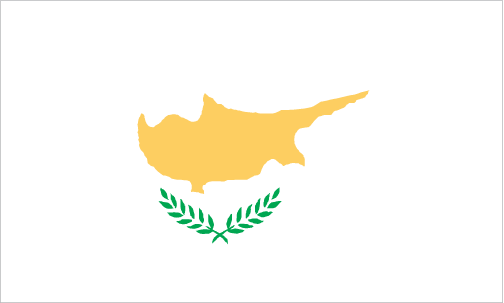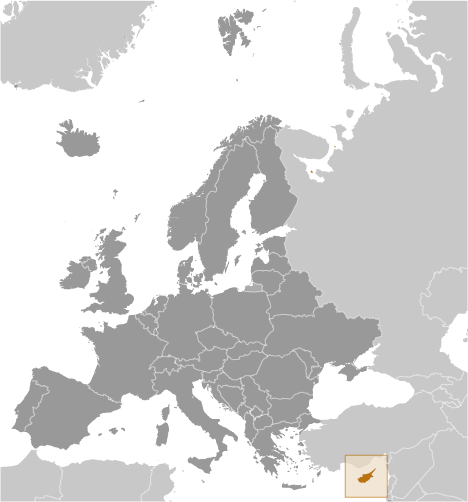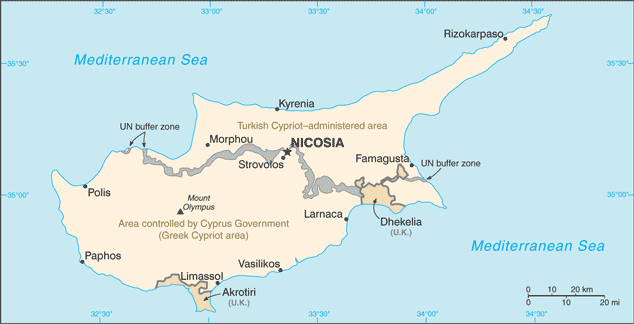|
Economy - overview:
|

|
|
The area of the Republic of Cyprus under government control has a market economy dominated by the service sector, which accounts for four-fifths of GDP. Tourism, financial services, and real estate are the most important sectors. Erratic growth rates over the past decade reflect the economy's reliance on tourism, the profitability of which can fluctuate with political instability in the region and economic conditions in Western Europe. Nevertheless, the economy in the area under government control has grown at a rate well above the EU average since 2000. Cyprus joined the European Exchange Rate Mechanism (ERM2) in May 2005 and adopted the euro as its national currency on 1 January 2008. An aggressive austerity program in the preceding years, aimed at paving the way for the euro, helped turn a soaring fiscal deficit (6.3% in 2003) into a surplus of 1.2% in 2008, and reduced inflation to 4.7%. This prosperity came under pressure in 2009, as construction and tourism slowed in the face of reduced foreign demand triggered by the ongoing global financial crisis. Although Cyprus lagged behind its EU peers in showing signs of stress from the global crisis, the economy tipped into recession in 2009, contracting by 1.7%, and has been slow to bounce back since, posting anemic growth in 2010-11 before contracting again by 2.3% in 2012. Serious problems surfaced in the Cypriot financial sector in early 2011 as the Greek fiscal crisis and euro zone debt crisis deepened. Cyprus's borrowing costs have risen steadily because of its exposure to Greek debt. Two of Cyprus's biggest banks are among the largest holders of Greek bonds in Europe and have a substantial presence in Greece through bank branches and subsidiaries. Cyprus experienced numerous downgrades of its credit rating in 2012 and has been cut off from international money markets. The Cypriot economy contracted in 2012 following the writedown of Greek bonds. A liquidity squeeze is choking the financial sector and the real economy as many global investors are uncertain the Cypriot economy can weather the EU crisis. The budget deficit rose to 7.4% of GDP in 2011, a violation of the EU's budget deficit criteria - no more than 3% of GDP. In response to the country's deteriorating finances and serious risk of contagion from the Greek debt crisis, Nicosia implemented measures to cut the cost of the state payroll, curb tax evasion, and revamp social benefits, and trimmed the deficit to 4.2% of GDP in 2012. In July, Nicosia became the fifth euro zone government to request an economic bailout program from the European Commission, the European Central Bank, and the International Monetary Fund - known collectively as the "Troika". Negotiations over the final details of the plan are ongoing.
|
|
|
GDP (purchasing power parity):
|

|
|
$23.57 billion (2012 est.)
country comparison to the world: 125
$24.11 billion (2011 est.)
$23.99 billion (2010 est.)
note:
data are in 2012 US dollars
|
|
|
GDP (official exchange rate):
|

|
|
$22.45 billion (2012 est.)
|
|
|
GDP - real growth rate:
|

|
|
-2.3% (2012 est.)
country comparison to the world: 210
0.5% (2011 est.)
1.1% (2010 est.)
|
|
|
GDP - per capita (PPP):
|

|
|
$26,900 (2012 est.)
country comparison to the world: 56
$28,000 (2011 est.)
$28,600 (2010 est.)
note:
data are in 2012 US dollars
|
|
|
GDP - composition by sector:
|

|
|
agriculture: 2.4%
industry:
16.7%
services:
80.9% (2012 est.)
|
|
|
Labor force:
|

|
|
416,900 (2012 est.)
country comparison to the world: 159
|
|
|
Labor force - by occupation:
|

|
|
agriculture: 8.5%
industry:
20.5%
services:
71% (2006 est.)
|
|
|
Unemployment rate:
|

|
|
8% (2012 est.)
country comparison to the world: 93
7.9% (2011 est.)
|
|
|
Population below poverty line:
|

|
|
NA%
|
|
|
Household income or consumption by percentage share:
|

|
|
lowest 10%: NA%
highest 10%:
NA%
|
|
|
Distribution of family income - Gini index:
|

|
|
29 (2005)
country comparison to the world: 118
|
|
|
Investment (gross fixed):
|

|
|
16.8% of GDP (2012 est.)
country comparison to the world: 125
|
|
|
Budget:
|

|
|
revenues:: $9.645 billion
expenditures::
$10.59 billion (2012 est.)
|
|
|
Taxes and other revenues:
|

|
|
43% of GDP (2012 est.)
country comparison to the world: 36
|
|
|
Budget surplus (+) or deficit (-):
|

|
|
-4.2% of GDP (2012 est.)
country comparison to the world: 143
|
|
|
Public debt:
|

|
|
80.9% of GDP (2012 est.)
country comparison to the world: 27
71.6% of GDP (2011 est.)
note:
data cover general government debt, and includes debt instruments issued (or owned) by government entities other than the treasury; the data include treasury debt held by foreign entities; the data exclude debt issued by subnational entities, as well as intra-governmental debt; intra-governmental debt consists of treasury borrowings from surpluses in the social funds, such as for retirement, medical care, and unemployment
|
|
|
Inflation rate (consumer prices):
|

|
|
3.4% (2012 est.)
country comparison to the world: 90
3.3% (2011 est.)
|
|
|
Central bank discount rate:
|

|
|
1.5% (31 December 2012)
country comparison to the world: 129
1.75% (31 December 2010)
note:
this is the European Central Bank's rate on the marginal lending facility, which offers overnight credit to banks in the euro area
|
|
|
Commercial bank prime lending rate:
|

|
|
7.2% (31 December 2012 est.)
country comparison to the world: 131
6.8% (31 December 2011 est.)
|
|
|
Stock of narrow money:
|

|
|
$14.73 billion (31 December 2011 est.)
country comparison to the world: 67
$14.6 billion (31 December 2010 est.)
note:
see entry for the European Union for money supply in the euro area; the European Central Bank (ECB) controls monetary policy for the 17 members of the EMU; individual members of the EMU do not control the quantity of money circulating within their own borders
|
|
|
Stock of broad money:
|

|
|
$56.25 billion (31 December 2011 est.)
country comparison to the world: 66
$52.97 billion (31 December 2010 est.)
|
|
|
Stock of domestic credit:
|

|
|
$51.19 billion (31 December 2012 est.)
country comparison to the world: 64
$53.1 billion (31 December 2011 est.)
|
|
|
Market value of publicly traded shares:
|

|
|
$2.853 billion (31 December 2011)
country comparison to the world: 78
$6.834 billion (31 December 2010)
$4.993 billion (31 December 2009)
|
|
|
Agriculture - products:
|

|
|
citrus, vegetables, barley, grapes, olives, vegetables; poultry, pork, lamb; dairy, cheese
|
|
|
Industries:
|

|
|
tourism, food and beverage processing, cement and gypsum production, ship repair and refurbishment, textiles, light chemicals, metal products, wood, paper, stone and clay products
|
|
|
Industrial production growth rate:
|

|
|
0.7% (2011 est.)
country comparison to the world: 137
|
|
|
Current account balance:
|

|
|
-$1.963 billion (2012 est.)
country comparison to the world: 135
-$2.546 billion (2011 est.)
|
|
|
Exports:
|

|
|
$1.889 billion (2012 est.)
country comparison to the world: 144
$1.957 billion (2011 est.)
|
|
|
Exports - commodities:
|

|
|
citrus, potatoes, pharmaceuticals, cement, clothing
|
|
|
Exports - partners:
|

|
|
Greece 27.4%, UK 10.2%, Germany 5.5% (2011)
|
|
|
Imports:
|

|
|
$7.716 billion (2012 est.)
country comparison to the world: 108
$8 billion (2011 est.)
|
|
|
Imports - commodities:
|

|
|
consumer goods, petroleum and lubricants, machinery, transport equipment
|
|
|
Imports - partners:
|

|
|
Greece 21.7%, Israel 10.4%, UK 9%, Italy 8.3%, Germany 8.3%, France 5.7%, China 4.8%, Netherlands 4.6% (2011)
|
|
|
Reserves of foreign exchange and gold:
|

|
|
$1.207 billion (2011 est.)
country comparison to the world: 130
$1.207 billion (31 December 2011 est.)
|
|
|
Debt - external:
|

|
|
$106.5 billion (31 December 2011 est.)
country comparison to the world: 42
$113.6 billion (31 December 2010 est.)
|
|
|
Stock of direct foreign investment - at home:
|

|
|
$29.38 billion (31 December 2012 est.)
country comparison to the world: 61
$27.18 billion (31 December 2011 est.)
|
|
|
Stock of direct foreign investment - abroad:
|

|
|
$13.62 billion (31 December 2012 est.)
country comparison to the world: 50
$12.62 billion (31 December 2011 est.)
|
|
|
Exchange rates:
|

|
|
euros (EUR) per US dollar -
0.7838 (2012 est.)
0.7185 (2011 est.)
0.755 (2010 est.)
0.7198 (2009 est.)
0.6827 (2008 est.)
|
|
|
Fiscal year:
|

|
|
calendar year
|
|
|
Economy of the area administered by Turkish Cypriots:
|

|
|
Economy - overview: The Turkish Cypriot economy has roughly half the per capita GDP of the south, and economic growth tends to be volatile, given the north's relative isolation, bloated public sector, reliance on the Turkish lira, and small market size. The Turkish Cypriots are heavily dependent on transfers from the Turkish Government. Ankara directly finances about one-third of the Turkish Cypriot "administration's" budget. Aid from Turkey has exceeded $400 million annually in recent years. The Turkish Cypriot economy experienced a sharp slowdown in 2008-09 due to the global financial crisis and to its reliance on British and Turkish tourism, both of which declined due to the recession. The Turkish Cypriot budget deficit also deteriorated in 2009 due to decreased state revenues and increased government expenditures on public sector salaries and social services. The Turkish Cypriot economy declined about 0.6% in 2010.
GDP (purchasing power parity):
$1.829 billion (2007 est.)
GDP - real growth rate:
-0.6% (2010 est.)
GDP - per capita:
$11,700 (2007 est.)
GDP - composition by sector:
agriculture: 8.6%, industry: 22.4%, services: 69.1% (2006 est.)
Labor force:
95,030 (2007 est.)
Labor force - by occupation:
agriculture: 14.5%, industry: 29%, services: 56.5% (2004)
Unemployment rate:
9.4% (2005 est.)
Population below poverty line:
%NA
Inflation rate:
11.4% (2006)
Budget:
revenues: $2.5 billion, expenditures: $2.5 billion (2006)
Agriculture - products:
citrus fruit, dairy, potatoes, grapes, olives, poultry, lamb
Industries:
foodstuffs, textiles, clothing, ship repair, clay, gypsum, copper, furniture
Industrial production growth rate:
-0.3% (2007 est.)
Electricity production:
998.9 million kWh (2005)
Electricity consumption:
797.9 million kWh (2005)
Exports:
$68.1 million, f.o.b. (2007 est.)
Export - commodities:
citrus, dairy, potatoes, textiles
Export - partners:
Turkey 40%; direct trade between the area administered by Turkish Cypriots and the area under government control remains limited
Imports:
$1.2 billion, f.o.b. (2007 est.)
Import - commodities:
vehicles, fuel, cigarettes, food, minerals, chemicals, machinery
Import - partners:
Turkey 60%; direct trade between the area administered by Turkish Cypriots and the area under government control remains limited
Reserves of foreign exchange and gold:
$NA
Debt - external:
$NA
Currency (code):
Turkish new lira (YTL)
Exchange rates:
Turkish new lira per US dollar: 1.668 (2011) 1.5026 (2010) 1.55 (2009) 1.3179 (2008) 1.319 (2007)
|
|
|
|





 )
)



